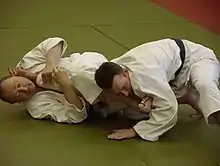Ude hishigi hiza gatame
Ude-Hishigi-Hiza-Gatame (腕挫膝固) is one of the official 29 grappling techniques of Kodokan Judo. It is one of the nine joint techniques of the Kansetsu-waza list, one of the three grappling lists in Judo's Katame-waza enumerating 29 grappling techniques.
| Ude hishigi hiza gatame | |
|---|---|
 Vladimir Lorenz shows Ude hishigi hiza gatame | |
| Classification | Katame-waza |
| Sub classification | Kansetsu-waza |
| Kodokan | Yes |
| Technique name | |
| Rōmaji | Ude-hishigi-hiza-gatame |
| Japanese | 腕挫膝固 |
| English | Knee arm bar |
All of Judo's competition legal joint techniques are arm locks.
Technique Description
Hiza refers to knee. Gatame refers to pin. This technique is using the knee to joint lock and pin the opponent. Once the opponent is face down an arm bar can be applied using the knee on the opponents elbow, the opponents hand must be pinky up. Upwards pressure can be applied on the wrist while downward pressure is applied with the knee on the elbow. The inside of the knee area can also be used to torque the elbow/shoulder from a bottom transition.
Similar Techniques, Variants, and Aliases
Variants
- Sankaku garami(Omoplata)
- Reverse Omoplata
- V-cross armlock

IJF Official Aliases:
- U.H. hiza gatame
- Hiza gatame(膝固)
Variants or Aliases
- Ude-Hishigi-Betsu-Gata
- Ude-Hishigi-Betsu-Gata is also described in The Canon Of Judo, this technique is similar to the second variation below, Ude-Hishigi-Ude-Gatame-Ni, except that Uke remains on their feet while Tori wraps one of his legs around Uke's arm.
- Hiza gatame ude kujiki
- Ude gatame ude kujiki
- Tachiai ude kujiki
Included Systems
Systems:
Lists:
- The Canon Of Judo
- Judo technique
- The video, The Essence of Judo featuring Kyuzo Mifune
- Hiza gatame ude kujiki
- Ude gatame ude kujiki(2nd patern,4th patern)
- Tachiai ude kujiki
References
- Mifune, Kyuzo (2004). The Canon Of Judo. Kodansha International Ltd. p. 150. ISBN 4-7700-2979-9.